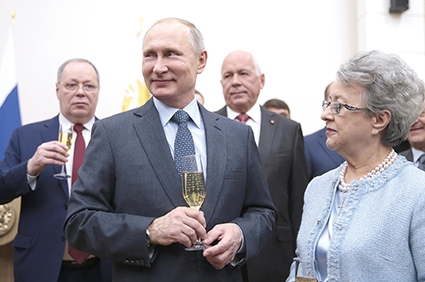What Could Putin’s Re-Election Mean for Georgia
Op-Ed
This Sunday, Russia will be choosing a president. The likely winner is the incumbent leader, Vladimir Putin, making his the longest rule since Stalin’s. But this next is set to be a far different term for Putin and the Russians.
In foreign policy, Russia is coming into a difficult time, seeing it facing a more-or-less united western front. Russian geopolitical influence in Ukraine, Georgia and Moldova has diminished over the past decade. Western encroachment on what had always been considered a Russian sphere of influence has reached new levels, unimaginable even at the time of the Soviet break-up in the early 1990s. Russia’s entire western frontier (except for Belarus) is now under Western influence, something the Russian government fears. Tragic pages from Russian history are well-remembered these days across the country. However, while previously the Russians managed to outmaneuver Charles XII, Napoleon and Hitler, today they face a rather different challenge: with the EU expanding economically, and NATO militarily, Europe is united and Moscow does not see (at least for the moment) any possibility to break this front. The foreign policy “blunders” happened under Putin and he will have to tackle them in his (likely) upcoming presidential term.
The United States is also mounting pressure on Russia in advancing military cooperation and general support to Ukraine and Georgia. The battle for the former Soviet states will take up an important place in the Russian politics of the next years.
Putin is also facing problems with the rise of China, although not necessarily in a military direction. Central Asia, another traditional powerbase of the Russian state, has already experienced the Chinese pull. Putin will also see that on the grand strategic level, his country, between the powerful EU in the west and China in the east, is less competitive economically: the Eurasian Economic Union is not producing the necessary results, while Russia’s economy, although out of recession, will lag behind in terms of economic growth for quite a time.
But Russia is also changing within. There is a certain pull towards a stricter rule where all seeming regional autonomies are restricted. Tatarstan, one of the richest regions, already experienced this. Problems are also seen among the youngsters. Many believe that Putin’s rule should not continue. For them, he has been the only leader they remember. Many (and perhaps the majority) of youngsters, however, do not contest the Putin rule and Putin is unlikely to face a significant opposition, which will move the country faster towards a stronger-controlled state.
This trend towards a tighter control has been a hallmark of Russian history. Liberals were always sidelined. Numerous Russian emperors and various rulers (including Dimitri Medvedev) promised to introduce liberal-based rule, which eventually turned out to be impossible.
Nor will foreign developments create too large an opposition to Putin’s rule among the population and his friends. But this mixture of pressures on Russia, where deep geopolitical differences make it very unlikely for normalization of relations between Moscow and western countries, creates good opportunities for neighboring small countries such as Georgia and Ukraine.
Tbilisi and Kyiv, facing huge military pressure from Moscow, have not had much of a chance to improve their geopolitical stance since the breakup of the Soviet Union. Therefore, in the long run, one of the questions the Georgian government should be contemplating is how far Russia could be weakened and what the benefits would be. Would that supposed Russian weakness in the face of western advancement constrain Russian positions in the South Caucasus?
Putin’s (potential) new term will be in many ways a decisive period in how Russia develops over the next decades. What is certain, though, is the continuing confrontation with the West and the rise of China, both being developments which would negatively affect Russia’s geopolitical position in Eurasia.
Emil Avdaliani












